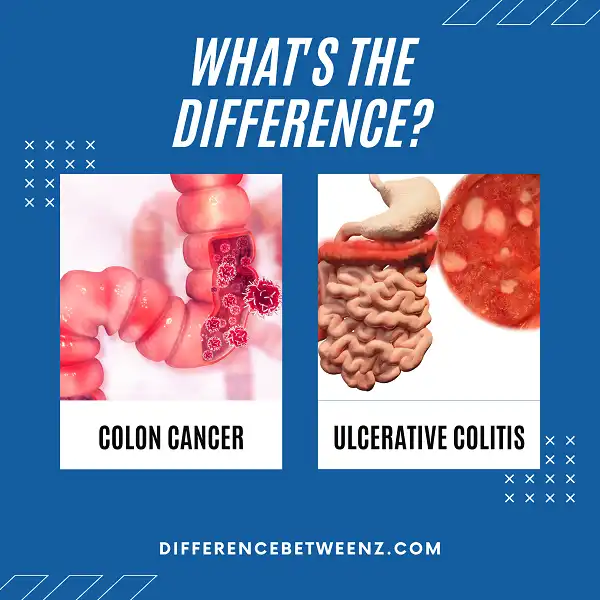While colon cancer and ulcerative colitis are both conditions that affect the colon, they are actually quite different. Colon cancer is a type of cancer that begins in the cells of the colon, while ulcerative colitis is an inflammatory bowel disease that causes inflammation and sores (ulcers) on the lining of the large intestine. In this blog post, we will take a closer look at these two conditions and discuss some of the key differences between them.
What is Colon Cancer?
Colon cancer is the abnormal growth of cells in the colon, which is a long, coiled tube in the digestive system. The colon absorbs water and nutrients from food and eliminates waste. Most colon cancers begin as small, noncancerous (benign) polyps that form on the inner lining of the colon. Over time, some of these polyps can become colon cancers.
- There are several different types of colon cancer, which are classified by the type of cell that is affected. The most common type is adenocarcinoma, which starts in the cells that line the inside of the colon. Other types include squamous cell carcinoma, mucinous carcinoma, and signet ring cell carcinoma. Colon cancer can be benign or malignant.
- Benign tumors are not cancerous and do not spread to other parts of the body. Malignant tumors are cancerous and can spread to other parts of the body if they are not treated. Colon cancer usually develops over many years with no symptoms or only very mild symptoms. As it grows larger, it can cause more serious symptoms, such as bleeding from the rectum or blood in the stool, a change in bowel habits (such as diarrhea or constipation), abdominal pain or cramping, weight loss, fatigue, and nausea.
- If you experience any of these symptoms, it is important to see your doctor so that they can rule out other causes and determine if you have colon cancer. Colon cancer is typically diagnosed with a Colonoscopy, during which a doctor inserts a flexible camera into the rectum to look for polyps or other abnormalities. Colon Cancer can also be detected with a CT scan or an MRI scan.
If you have Colon Cancer, treatment will depend on the stage of cancer and may include surgery, chemotherapy, or radiation therapy. Early detection is key to the successful treatment of Colon Cancer.
What is Ulcerative Colitis?
Ulcerative Colitis is a chronic disease that affects the large intestine, also known as the colon. The colon is a long, coiled tube that removes wastes from the body. Ulcerative colitis causes inflammation and ulcers, or sores, in the inner lining of the large intestine.
Ulcerative colitis most often affects people between the ages of 15 and 30, but it can occur at any age. Ulcerative colitis is not contagious. It is not known what causes ulcerative colitis, but it is believed to be a combination of genetic and environmental factors.
Ulcerative colitis is a serious disease that can be debilitating and even life-threatening. There is no cure for Ulcerative Colitis, but there are treatments that can help to manage the symptoms and improve quality of life.
Difference between Colon Cancer and Ulcerative Colitis
Colon cancer and ulcerative colitis are two conditions that affect the large intestine. Colon cancer is a type of cancer that begins in the lining of the colon, while ulcerative colitis is a chronic inflammatory condition that affects the lining of the colon and rectum. Both conditions can cause symptoms such as abdominal pain, blood in the stool, and weight loss. Colon cancer is typically treated with surgery, while ulcerative colitis is treated with medication and lifestyle changes.
Conclusion
Ulcerative Colitis and Colon Cancer are two different diseases that affect the colon. They have different symptoms and require different treatments. If you are experiencing any of the symptoms listed above, it is important to see a doctor and get diagnosed. Early diagnosis is key to getting the best treatment possible.


